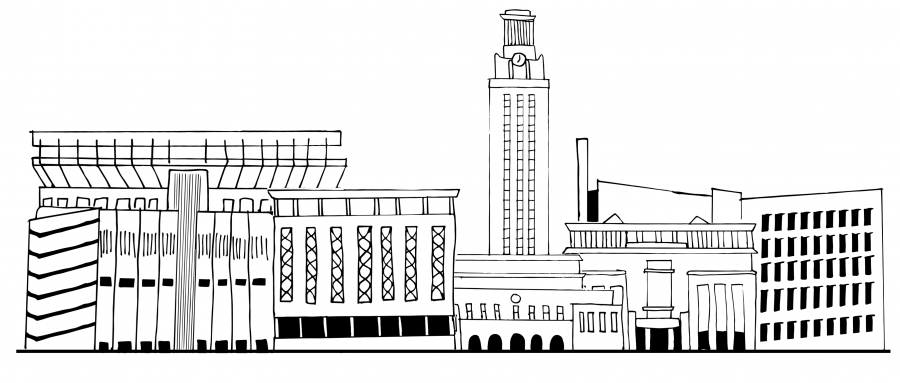In response to the countless number of Black lives lost to police brutality and racial injustice, the UT community has rallied behind a list of demands titled “Student Community Statement: 8 Demands for Transformative Change.” We stand firmly behind this statement and each demand.
The University of Texas at Austin must:
1. Divest from the Austin Police Department and the University of Texas at Austin Police Department.
The University of Minnesota is distancing itself from the Minneapolis Police Department, and after the recent death of Michael Ramos in Austin at the hands of the Austin Police Department, UT has every reason to do the same. UT must divest from the University of Texas at Austin Police Department and instead invest in nonviolent, community-led programs on campus, such as food security resources and mental health services. This would allow the University to support its student population while limiting UTPD’s involvement in situations police officers are poorly equipped to handle.
2. Implement a test-optional undergraduate and graduate admissions policy.
More than 1,200 American universities, including Texas A&M University, employ a test-optional admissions policy. As student leaders acknowledge, UT’s ACT/SAT score requirement was born out of UT Office of Admissions’ desire to counteract integration efforts in the 1950s — its roots are inherently racist. Black students still only make up 4.9% of UT’s student population. If UT is truly “dedicated to attracting highly-qualified students, faculty and staff with a wide range of backgrounds, ideas and viewpoints,” then it must abandon its SAT/ACT score requirement.
3. Incorporate land acknowledgments in all UT programming.
UT was built on indigenous territory, specifically the land of the Apache, Alabama-Coushatta and Kickapoo tribes. Several UT centers have already acknowledged this, as have comparable universities such as the University of Illinois System, the University of Connecticut and the University of California-Davis. Publishing a land acknowledgment statement and incorporating readings of the statement into large-scale events would ensure UT properly honors the indigenous peoples who lived on this land for centuries.
4. Use a multifaceted approach to incorporate conversations on race and systemic racism in the United States.
UT requires freshmen to complete modules and attend presentations designed to educate students on safety practices, diversity and college life. These programs fail to address the racism BIPOC are subject to and how it presents itself on campus — be it explicit or microaggressive. There is a demand for racial literacy courses at UT and nationwide support for incorporating racial literacy into education. UT must incorporate anti-racism training into mandatory orientation programs.
5. Rename Robert Lee Moore Hall, T.S. Painter Hall, Littlefield Residence Hall, Littlefield Patio Cafe, Littlefield Fountain, Belo Center for New Media and James Hogg Auditorium as well as remove the James Hogg Statue to stop honoring people who perpetuated racism on this campus.
Students have been pushing the University to rename buildings on campus named after racists since the turn of the century. These buildings, statues and spaces don’t reflect positively on UT. If UT cares at all about its students of color, its professional reputation and mitigating the harm caused by these buildings’ namesakes, it must immediately remove these names from its campus.
6. Discontinue the use of “The Eyes of Texas” at all UT related events.
Our community has debated the song’s place for years, as its racist origins — being traditionally sung in blackface at minstrel shows — offend many students. UT has neglected to educate students on its history, and there is widespread support among students, faculty and athletes to discontinue the tradition. By neglecting to condemn or halt the promotion of this song, UT is actively whitewashing the University’s treatment of BIPOC. This invalidates the racism BIPOC have historically faced at UT.
7. Adopt equitable and inclusive practices in the recruitment, selection and promotion of UT faculty.
UT has a problem retaining diverse faculty. Only 3.8% of faculty identify as Black as of 2019. Hiring professors from a variety of backgrounds will ensure that students of color feel represented on campus. Moreover, expanding the ethnic studies programs will ensure that students can take courses on issues pertaining to race and ethnicity. UT has adopted multiple incentives to recruit more diverse professors, but these incentives have obviously not done enough.
8. Institutionalize and fund a campus climate survey.
If UT truly wants to make our campus inclusive for all students regardless of race, ethnicity, gender, sexuality, ability or other identity, campuswide surveys are essential, as they allow students to bring concerns about inclusivity directly to administrators. Oppression manifests itself in a variety of ways on our campus, and only students themselves can know how and where they experience it. Other universities have conducted universitywide surveys. UT must do the same.
These issues will not be solved, and these demands will not be satisfied by simply having “hard conversations.” Students are demanding UT take concrete action.
You can read the full Student Community Statement here:
https://tinyurl.com/ut-statement
And sign it here:
http://tinyurl.com/UTChange
You can also sign a change.org petition that makes many of the same demands here:
http://chng.it/hRTwhVkWHy
“We are aware of three petitions created by students and look forward to working with them and the UT community to create the best possible experience on our campus for Black students,” said J.B. Bird, director of media relations and issues management for University Communications.
Let’s hope that’s true.
Editor's note: A previous version of this story incorrectly stated the number of UT Austin students who had signed the Student Community Statement. The Texan regrets this error.





















